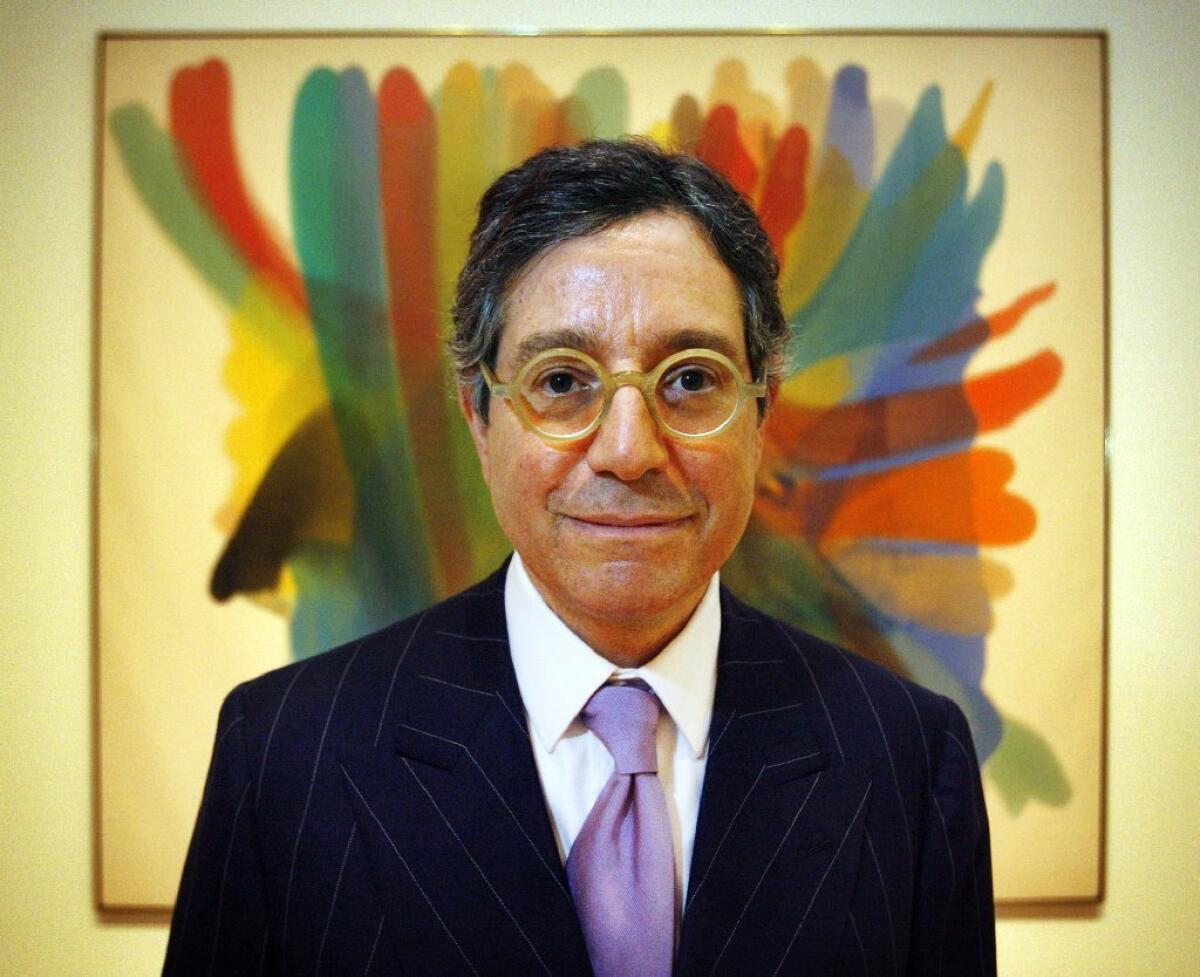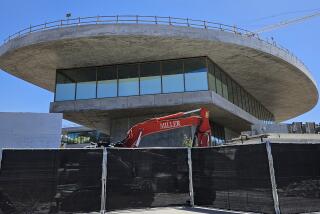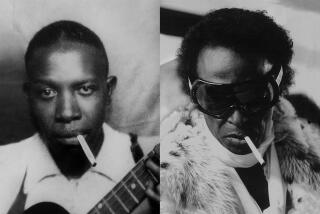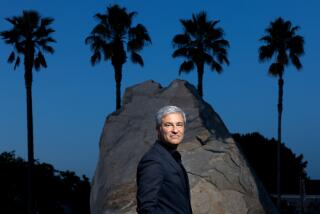Jeffrey Deitch’s next chapter: big art shows, but not at museums

Jeffrey Deitch says his next move in the art world following his premature exit as director of Los Angeles’ Museum of Contemporary Art will happen in New York City: a bid to create a “hybrid” between a museum mounting exhibitions geared to a broad general audience, and a gallery that doesn’t have to deal with the complex institutional issues that come with running a nonprofit museum.
“I’m more interested in the exhibition project than the institution,” Deitch said Tuesday after engaging in a public conversation about creativity and entrepreneurship with fellow guest Michael Chow, known for making visual artists and their work part of the fabric of his Mr. Chow Chinese restaurants, and host Steven Lavine, president of California Institute of the Arts.
In an interview after the 90-minute session before an audience of more than 200 at REDCAT, CalArts’ downtown L.A. theater and gallery, Deitch said he’s keeping his Los Angeles home and expects to spend much of his time here, but is hunting in New York City for a venue where he can anchor his next venture.
GRAPHIC: MOCA’s ups and downs with Jeffrey Deitch
“It’s in development. A few things have to come together,” Deitch said.
One of the reasons he took the director’s job at MOCA in 2010, he said, was the opportunity to focus on perhaps two major exhibitions a year instead of the dozens of smaller ones he customarily had organized at his Deitch Projects galleries in New York. There, some of the profits he made as an art dealer were funneled into less commercial shows that often explored how pop culture and visual art intersect.
The idea going forward, he said, is to continue doing big, museum-scale shows, but without the institutional constraints of a museum.
“I’ve been talking to potential collaborators” who could help fund the venture, he said, among them AEG, the L.A.-based entertainment company that has an arts and exhibitions division to go with a pop concert and sports empire that includes Staples Center, L.A. Live and ambitions to acquire a National Football League franchise for which it would build a downtown stadium.
CHEAT SHEET: Fall arts preview
A little more than three years into his five-year contract, Deitch announced in late July that he was stepping down as MOCA’s director. He said his sojourn in the nonprofit museum world officially ended Sept. 1.
It was a turbulent ride, during which Deitch had admitted that fundraising — an imperative for a nonprofit museum director — had proved difficult.
MOCA was far from financially flush when he began, having spent down most of its endowment during the previous decade. But the problems Deitch had in winning over and managing a large staff and enlisting the unified support of a nonprofit board of trustees became evident by late winter 2012 and exploded into a crisis that summer following the forced resignation of longtime chief curator Paul Schimmel.
Budget cuts, layoffs and open contention on the board over Deitch’s creative choices ensued.
ART: Can you guess the high price?
Questions arose about seven months ago over whether MOCA could sustain itself as an independent institution, and led to a takeover offer by the Los Angeles County Museum of Art.
MOCA’s board decided in May to preserve the museum’s independence, embarking on a campaign to lift its endowment from about $20 million to $100 million.
The REDCAT event was Deitch’s first public speaking engagement since resigning from MOCA, although he’s been spotted at a number of art world events since then. Next up is a lecture for UCLA’s Design Media Arts Department at 6 p.m. on Oct. 23 at the university’s Broad Art Center. Admission is free.
In the interview Tuesday and during his conversation with Chow and Lavine, Deitch pointed to the high point of his MOCA tenure, the 2011 “Art in the Streets” exhibition of graffiti and street art that drew more than 201,000 viewers, ranking with a 2002 Andy Warhol retrospective as the best-attended shows in MOCA’s 30-year exhibition history.
“I learned a lot from the experience with ‘Art in the Streets,’ ” Deitch said in the interview, adding that he aims to continue “the kind of exhibition that engages people” and promises to draw well enough to sustain itself outside a donations-based nonprofit infrastructure. Art museums typically rely on donors for 80% or more of their funding.
Deitch said he hopes to organize shows where “you get a big gate with admission fees, substantial sales of merchandise, and attract potential sponsors who want to be part of this. It’s a model without all the overhead of a museum and its collections and departments. I believe it’s possible for programs to be much more self-supporting than the conventional museum approach.”
One of them might be “Fire in the Disco,” an exhibition focused on how the culture of disco music and visual art fed each other during the 1970s. Deitch had announced it in 2012 as a show he was developing for MOCA. On Tuesday he said the show is off MOCA’s agenda and he’s free to run with it on his own.
“We’ve gone very far with that,” Deitch said. “We have the whole curatorial team. It doesn’t need a museum to be realized, it can be self-supporting.”
GRAPHIC: Highest-earning art executives | Highest-earning conductors
Deitch said that other exhibition ideas he’d initiated at MOCA still might come to fruition at the museum, but it would depend on whether his eventual successor would want to carry them forward.
MOCA spokeswoman Lyn Winter attended the REDCAT event and said the search for a new director was continuing and would likely take additional months.
Part of the discussion focused on why L.A. hadn’t developed the kind of freewheeling, informal meeting places for creative cross pollination that Deitch said Mr. Chow became in late-’60s London and in the early 1980s in New York City, when he recalled mixing with luminaries such as Jean-Michel Basquiat at the Manhattan Mr. Chow that opened in 1979. The restaurant’s Beverly Hills edition, open since 1974, is known for its Hollywood clientele rather than for visual artists and rock musicians.
“The most exciting periods in our culture are periods when it all converges — fashion, art, film, they all interrelate and one form makes the other more interesting,” Deitch said during the discussion. “We were hoping to have that energy here [in L.A.]. It hasn’t totally converged yet, but there’s great potential for it.”
PHOTOS: Arts and culture in pictures by The Times
The theme of L.A. somehow not having reached a level of visual art convergence was not tempered during the discussion by any mention of the blossoming of the Southern California art scene that was documented by the Getty Trust-instigated “Pacific Standard Time: Art in L.A. 1945-1980” region-wide exhibition initiative of 2011.
That flowering sprang largely from educational institutions that attracted and fostered brilliant students who stayed in L.A. to launch their careers — among them CalArts and its precursor, the Chouinard Art Institute, UCLA, Otis College of Art and Design and UC Irvine. The late Mike Kelley, who trained at CalArts, and UC Irvine alumnus Chris Burden are the subjects of current major retrospectives at Manhattan museums.
But this was not an evening for focusing on the accomplishments and legacies of institutions, the assumption being that creativity’s next phase will belong more to entrepreneurs than institution-builders.
ALSO:Relentlessly stylish Mr. Chow
MOCA director Jeffrey Deitch defends ‘seriousness’ of shows
A post-Jeffrey Deitch MOCA presents a major challenge for next director
More to Read
The biggest entertainment stories
Get our big stories about Hollywood, film, television, music, arts, culture and more right in your inbox as soon as they publish.
You may occasionally receive promotional content from the Los Angeles Times.











